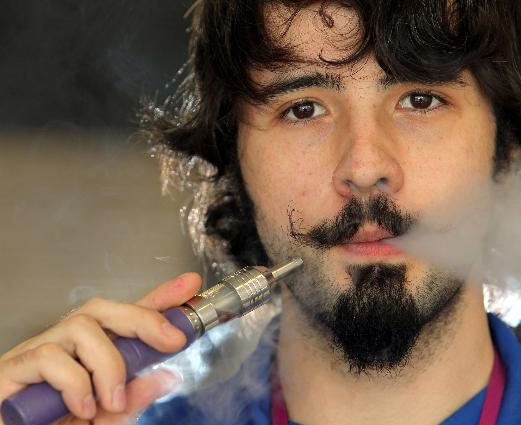E-cigarette maker targets Colorado
By Carol McKinley
Colorado Public News
The arrival of electronic cigarettes has raised a red flag for health officials and others who worry the activity of “vaping” nicotine will hook young people into a new addiction that could last a lifetime.
In Colorado, the concern is heightened by the arrival of tobacco giant R.J. Reynolds Tobacco Co. Beginning this month, the maker of Camel cigarettes and other tobacco products began selling its new e-cigarette – called Vuse – along Colorado’s Front Range as one of four test markets.
“We’ve done a lot of work to make it not cool to smoke, and we’d hate to see that rolled back,” said Stephanie Walton, youth policy coordinator for the Colorado Department of Public Health and Environment.
Pat Senecal, director of health policy and systems at San Juan Basin Health Department in Durango, said Friday that the Federal Drug Administration is worried about test marketing and availability of e-cigarettes.
“The FDA has no regulatory authority yet over e-cigarettes, so the risks aren’t known,” Senecal said. “E-cigarettes have flavoring, and studies of other tobacco products show that flavoring appeals to youths.”
The Colorado Department of Public Health and Environment said in a statement Friday: “Too much remains unknown about the potential health risks of these new nicotine products. We are concerned that the tobacco industry is introducing yet another product to Coloradans that is addictive and potentially harmful to their health.”
Also known as personal vaporizers, e-cigarettes broke into the American market six years ago. They look like cigarettes, but do not contain tobacco. They actually are battery-operated inhalers that turn nicotine into a vapor. The liquid, or “E-Juice” that is vaporized can carry a range of tasty-sounding flavors such as cotton candy and peach and names like “Bikini Martini” and “Choco Loco.” E-cigarettes aren’t “smoked,” they are “vaped.”
Studies long have determined that nicotine is as addictive as heroin and cocaine, leaving health officials such as Walton concerned.
“If children see e-cigarettes as popular and fun and start using them, that can lead to a lifetime of nicotine addiction,” she said.
Many Americans report they’ve never heard of e-cigarettes, but the industry now is generating $500 million in sales annually. Business is expected to surpass $1 billion annually within the next couple of years.
E-cigarettes generally are sold in places where tobacco products are available, as well as in specialty shops and in shopping malls. Since at least 2009, the federal Food and Drug Administration has warned about potential health risks associated with e-cigarettes. In addition to nicotine, the products contain substances such as propylene glycol and artificial flavors that might, the agency warns, penetrate deeply into the lungs. However, the products – at least for now – are not regulated.
More than a dozen states, including Colorado, have banned the sale of e-cigarettes to minors. But Walton and others are concerned that advertising, and the tasty-sounding flavors, will directly appeal to young people.
“We would love to see the FDA look into this, especially with some of the larger tobacco companies really taking an interest in these products now,” Walton said.
But some vendors who sell e-cigarettes say they promote the product as a healthier alternative to traditional cigarettes and a way to wean people off of tobacco products.
Within three days of last summer’s mass shooting in Aurora, Colorado-based e-cigarette company VeppoCig.com began offering trial kits for free to anyone who had been at the theater and was suffering from post-traumatic stress disorder.
“Above all, we are a company that cares for the health of our customers. We understand that they are going through a difficult time, and we want to help,” the company announced.
John Paul Pollock of The Vapor Store in Golden described e-cigarettes as “a dignified alternative for people who smoke.”
However, Walton rejects comparison to other stop-smoking products – such as the FDA-approved nicotine patch and nicotine-infused gum.
“There is no research that shows that (e-cigarettes) are an effective cessation or stop-smoking aid or device,” she said.
Still, e-cigarettes are catching on worldwide. A recent survey found that nearly 10 percent of Parisian schoolchildren between the ages of 12 and 17 have tried them. There are many active e-cigarette forums and Facebook pages. One website discussion in Colorado asks if people can “vape” in casinos in the mountain gambling town of Black Hawk and advertises meet-ups where fellow “vapors” can connect.
Because e-cigarettes are not a tobacco product, companies can get around 42-year-old laws that ban cigarette advertising. Currently, the largest concentration of e-cigarette ads is online. But with big companies such as R.J. Reynolds entering the marketplace, some predict advertising on TV, radio and billboards is not far behind.
“By around August, we should start seeing significant TV advertising, as well as online,” said Colorado-based marketing executive Brent Green. In addition, he said, “there will be live sampling at nightclubs and festivals where people gather.”
Green, a critic of e-cigarettes, highlighted the dangers of romanticizing e-cigarettes. For example, recently, actor Leonardo DiCaprio was seen vaping in public.
“You show celebrities, you show cool adults using the product – kids always aspire to act and react like adults. They want to be grown up,” said Green.
It is unclear why R.J. Reynolds selected Colorado as its test market for the new product. During a recent press conference, R.J. Reynolds Vapor Co. president Stephanie Cordisco would say only that “Colorado represents just one of our major states as we are rolling this out.”
Company officials did not return subsequent calls from Colorado Public News.
Even the Colorado Department of Public Health and Environment says it can’t get a definitive answer as to why Colorado was selected.
“We’re not sure why. We would love to know,” said Walton.
The Centers for Disease Control and Prevention reports nearly 1 in 5 Coloradans smoke cigarettes, ranking the state 10th nationally.
Durango Herald Staff Writer Dale Rodebaugh contributed to this report. Colorado Public News, a nonprofit news organization, reports on issues of statewide interest. It partners with Colorado Public Television 12, Denver’s independent PBS station.
http://durangoherald.com/article/20130713/NEWS01/130719776/E-cigarette-maker-targets-Colorado
http://durangoherald.com/article/20130713/NEWS01/130719776/E-cigarette-maker-targets-Colorado


